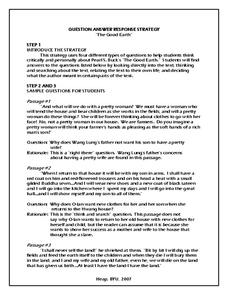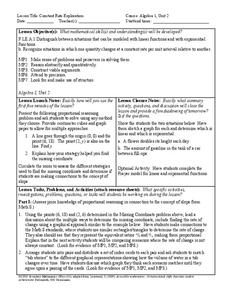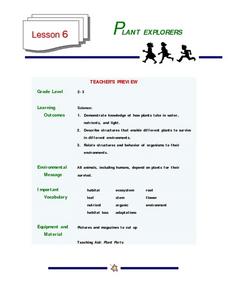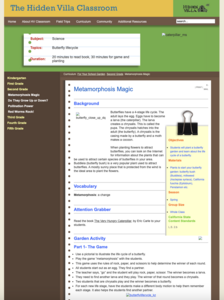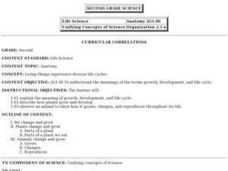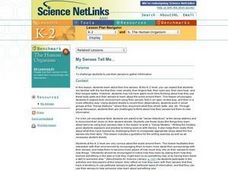Positively Autism
"What to Expect on Mother's Day" Social Story
Not only does this social story tell kids what to expect on Mother's Day but it also offers an explanation for why we celebrate moms and includes suggestions for possible Mother's Day gifts.
Novelinks
The Good Earth: Question Answer Response Strategy
Readers of Pearl Buck's The Good Earth craft and answer "Right There," "Think and Search," "On Your Own," and "Author and You" questions.
ESL Kid Stuff
Colors
You can sing a rainbow with a fun set of color-themed activities. Kids learn a song, match colors to objects, and jump up and down as they practice their color recognition.
Casimir Middle School
Biological Classification Worksheet
Classify living things with a set of worksheets that has pupils sorting and indentifying living and non-living things. Learners use the worksheets as a basis for finding their answers.
Science Matters
Plot Study
Small groups investigate plots of land to discover how abiotic and biotic factors interact. After recording their findings, scholars share observations with peers and self-reflect on the learning process.
Howard County Schools
Constant Rate Exploration
Question: What do rectangles and bathtub volume have in common? Answer: Linear equations. Learn how to identify situations that have constant rates by examining two different situations, one proportional and one not proportional.
University of Florida
Sailing to St. Augustine
Using a Florida map from 1597, young explorers consider the physical characteristics they would need in a site for a new colony and the resources they would need to survive. After selecting a site, class members research to discover the...
Curated OER
Plant Reproduction
In this plant reproduction activity, students complete a crossword puzzle with 36 questions. They identify the different plant reproductive features.
Curated OER
Plants Vocabulary Quiz
For this plant vocabulary worksheet, students draw lines to match 10 plant words with their meanings. Prior knowledge is assumed.
Curated OER
Water Pollution and Food Chains
Sixth graders study the effect of pollution in our food chains. In this plant biology lesson, 6th graders first experiment with pollution by placing a carnation in colored water. Next they use a food chain triangle to see the concept of...
Curated OER
Plants 1: Plant Parents
Students review their prior knowledge on plants. In groups, they compare and contrast the difference between reproducing asexually and sexually. Using the internet, they research how some plants can be forced to produce asexually.
Curated OER
Water Properties introduction
Students list items they know and want to know about water on personal K-W-L charts. They describe what happened during the warm up activity in their science journal. Students travel to four different stations and perform the different...
Curated OER
Plant Explorers
Students investigate how plants take in water, nutrients, and light. They create artwork showing how plants survive in different environments.
Curated OER
Metamorphosis Magic
Students play rock-paper-scissors and create a play to demonstrate the butterfly life cycle. In this butterfly life cycle lesson plan, students also plant a butterfly garden with plants that attract butterflies.
Curated OER
Hunt the Fact Monster (Extra #3)
In this Fact Monster search engine worksheet, students access the Internet to one specific website to answer five questions with multiple choice answers.
Curated OER
Prairie Find Outdoors
Pupils take a field trip to a local prairie. Using identification books, they identify various forbs and grasses in the prairie. As a class, they discuss the importance of forbs and grasses to the ecosystem and review the various types...
Alabama Learning Exchange
Nature's Life Cycle
Become a member of the Pollution Patrol and stand up to litter! After discussing the life cycle of seeds and discussing how plants figure into the food chain, young conservationists engage in several activities involving podcasts,...
Curated OER
Making Pretzels
Students explore how people use plants for food. They use pretzels to see how wheat can be turned into food.
Curated OER
Whales
First graders investigate two different types of whales; toothed and baleen. They describe what the different types of whale eat. They listen to a cassette of Dyan Sheldon's, The Whale Song before making stick puppets to dramatize the...
Curated OER
Living Things Experience Diverse Life Cycles
Second graders will study and explain the meaning of growth, development, and life cycle. They describe how plants grow and develop and observe an animal to show how it grows, changes, and reproduces throughout its life.
Curated OER
Will It Grow?
Fifth graders conduct experiments involving plants. In this science lesson, 5th graders design an experiment involving plants. Students use the scientific method to design their experiments.
Curated OER
My Senses Tell Me...
Students work at "Sense Stations" to explore each of the five senses.
Curated OER
Agriculture in Your Life
Students examine the agricultural sources of everyday products and identify food products outside traditional farming circles. They discuss the background information, and complete activity sheets, locating various commodity locations on...
Curated OER
Monet and Impressionism
Monet is a great artist to study and impressionism is a wonderful art style to practice. Learners read about Monet then attempt to use impressionist painting techniques. Book and image links are included.



